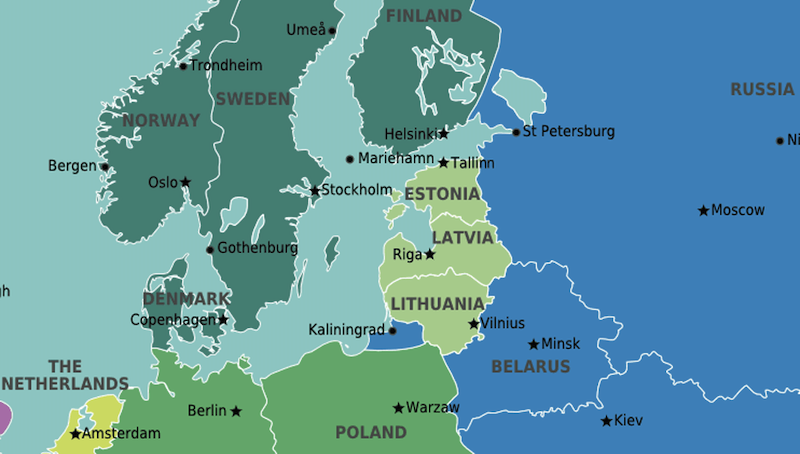Despite multiple foreign conflicts and his efforts to destabilize Western democracies, Canadians largely believed until last week that Mr. Putin was a leader concerned by his reputation, and respectful of the rule of law. Every time Mr. Putin invaded a neighbouring country, assassinated his critics or violently repressed his own people, we thought he could be shamed into changing his behaviour by expressing our concerns and issuing toothless condemnations.
How very wrong we have been. Our failure to respect the warnings of our allies on the North Atlantic Treaty Organization’s eastern flank, and our belief that rhetoric and diplomacy would deter Mr. Putin, have enabled the barbaric invasion we are witnessing in Ukraine today.
Whenever the Baltic states or Ukraine raised concerns about Russia’s growing aggression over the past decade, many in the West simply dismissed them as being “Russophobic.” Their concerns were chalked up to historical traumas, rather than the experiences these countries have had to endure over the past century. But for the Baltic states, the present threat of Russian aggression has loomed large since Mr. Putin took office in 2000.
In 2007, the Russian embassy in Estonia provoked civil unrest after the Estonian government relocated an offensive Soviet war memorial from the centre of the capital, Tallinn, to a nearby war cemetery. Rioters organized by the Russian government threatened to destabilize the country and were simultaneously accompanied by the first-ever state-sponsored cyberattack by Russia, against Estonia’s banking, media and government digital infrastructure.
Since then, Russia has regularly tested Western resolve and unity by violating international norms and laws – and it’s been able to do so with relative impunity.
Mr. Putin faced no consequences for his 2008 Olympics invasion of Abkhazia and South Ossetia in Georgia; Western condemnation of the invasion was swift, but failed to motivate the Russian President to return any of the territories he occupied.
In 2014, Mr. Putin invaded Crimea and eastern Ukraine, again without suffering meaningful consequences in the aftermath. Even after Russian surface-to-air missiles brought down a civilian Malaysian airliner over Donbas, the Western world failed to introduce any significant costs to deter Mr. Putin’s future aggression. Western democracies have been under attack by Russian disinformation and influence operations ever since.
Throughout Mr. Putin’s rule, Estonians, Latvians and Lithuanians have calmly taken their own measures to address Russia’s expanding aggression. They have actively supported exiled Russian prodemocracy and human-rights activists. Lithuania’s capital has become the seat for Svetlana Tikhanovskaya’s exiled Belarusian government. In 2016, the Baltics successfully advocated for the implementation of Enhanced Forward Presence (EFP) missions in each of the Baltic countries and Poland, to bolster the presence of NATO in the region.
Over this past week, the importance of those missions in deterring Russian aggression against NATO has been significantly underscored. Without them, Mr. Putin may have targeted one or all of the Baltic states. Canada’s leadership of NATO’s Latvian mission has been embraced and acknowledged by all three Baltic governments.
The psychological reassurance that these missions offer is just as significant as the military deterrence they provide. But this may no longer be enough to deter Mr. Putin.
After this week, we cannot rule out the possibility that Russia may test NATO’s resolve in the Baltics in the coming months. As such, Canada and NATO must establish permanent bases in each of the Baltic states, so long as Mr. Putin is in power. Last year, he changed Russia’s constitution to allow himself to remain in office until at least 2035. Presuming he survives his invasion of Ukraine, Mr. Putin will remain a persistent and significant threat to European and global stability for years to come.
Ironically, it seems that in the early morning hours of Feb. 24, Mr. Putin may have finally awoken the West to the threat that he represents. Empty rhetoric was replaced by moves to unify the Western world. Canada, which has been reluctant to arm Ukraine, is now sending thousands of anti-armour rockets to help defend its sovereignty. The West has finally started to realize that if Ukraine falls, NATO will be next.
If we’ve learned anything over the past week, it’s that we should have listened to those who know Mr. Putin and Russia best. Let’s not make that mistake again.
Marcus Kolga, Toronto
Original article here: www.theglobeandmail.com




